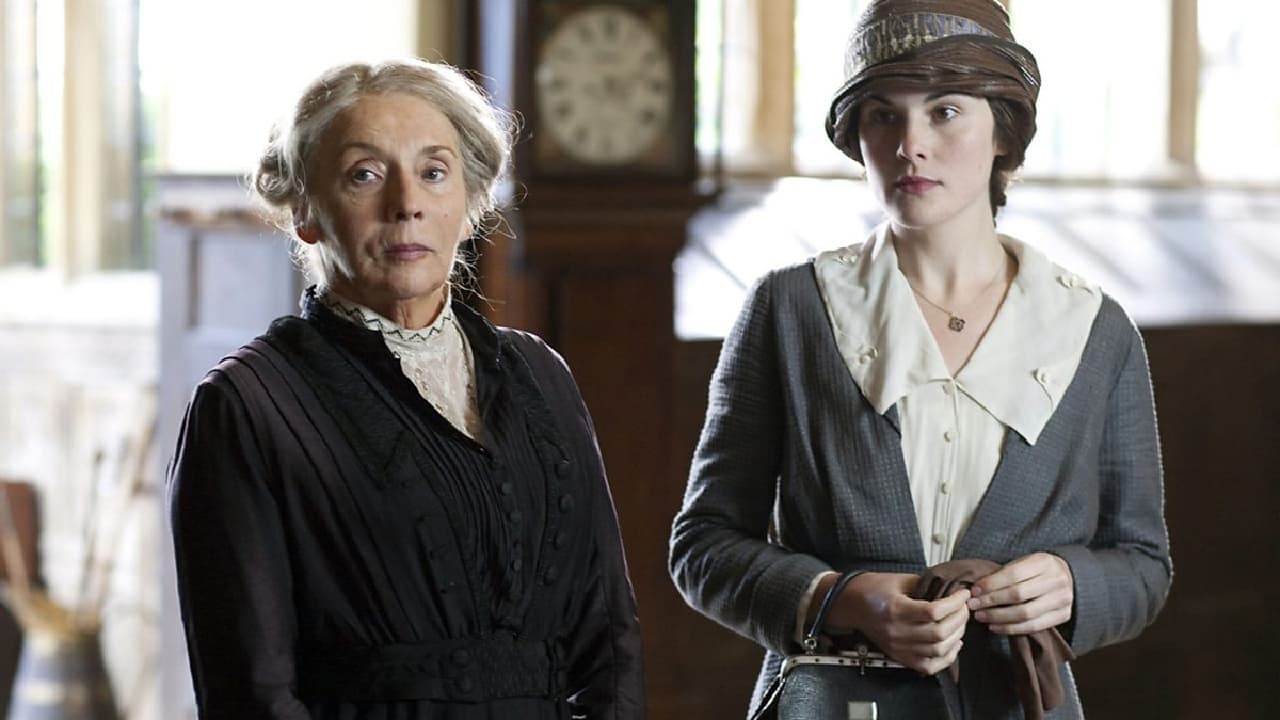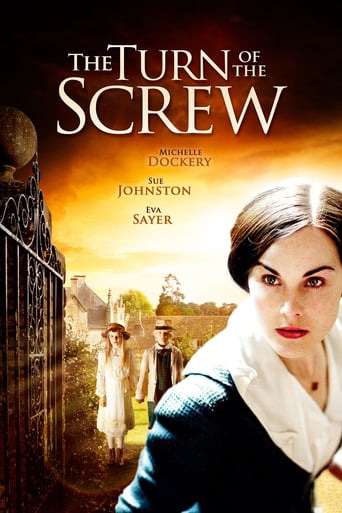

Good story, Not enough for a whole film
... View Morebrilliant actors, brilliant editing
... View MoreAll of these films share one commonality, that being a kind of emotional center that humanizes a cast of monsters.
... View MoreIt is encouraging that the film ends so strongly.Otherwise, it wouldn't have been a particularly memorable film
... View MoreThe BBC have a long tradition of adapting literary ghost stories at Christmas time and THE TURN OF THE SCREW is their effort for 2009, yet another adaptation of the Henry James chiller condensed into a TV film running time. I wonder why they bothered? This is flimsy, light weight stuff, neither scary nor sufficiently interesting to capture the attention, and probably the worst ghost story they've ever made (at least until the much-tinkered O WHISTLE AND I'LL COME TO YOU featuring John Hurt came out).Perhaps fearing that the story has been done to death in the past, the scriptwriter updates the events to WWI, but for no reason – it alters the story in no way. Sadly, for a ghost story, there's no spookiness either, unless some lame flash cutting to supposedly frightening faces and figures is your idea of the utmost in terror. The mostly theatrical cast seem ill at east in front of the cameras, with the lead, Michelle Dockery, particularly unappealing as the fragile governess caught up in the sinister events. This feels low budget and lacking in the extreme, as if they got half a dozen cast members into an old house and filmed it quickly without much effort. To be frank, it's a real chore to sit through. Stick with THE INNOCENTS!
... View MoreThis filmed version of James' novella is a travesty. It begins with the conceit of the insane asylum, in which the Governess is an inmate, as if this were an acceptable or even clever way to evoke the issue of her questionable sanity. The shots and cuts seem to be meant to reinforce this simplistic kind of ambiguity, certainly with none of the subtlety of James' work, and sometimes even to opposite effects, and often garishly. For example, when the Governess first arrives at Bly, she is greeted by the staff. The camera pans over their faces and cuts to close-ups of especially sour-looking expressions in order to make us wonder whether this is really such a nice place, or perhaps that some of these unhappy people may wish her harm. To get at the latent sexuality of the text, this filmed version relies on a piece of lingerie, flashbacks of Quint atop Jessel in bed, and the Governess' fantasies of her and the uncle in various hackneyed romantic gestures. Mrs. Grose's rosy, innocent, and reliable sympathy with the Governess in the novel has been eradicated here and replaced with her somewhat cold rejection of the Governess' claims to have seen Quint and Jessel.There's more. The music has been expediently installed to cue the intended emotional responses. The dialogue and characterizations, with their overwrought emotion, are both anachronistic and unconvincing, and get worse as the film wears on, ending with the children's swearing at the Governess, a device that's just plain tacky, and Miles' pummeling Flora, slapping her face and calling her the b-word before he dunks her head into the water of the lake. This is how the filmmakers attempt to answer the question, What harm might Quint and Jessel intend for the children? Why, to make the children into likenesses of themselves of course! Hence, at the end, Miles kisses the Governess passionately, while the image of the actor who plays Quint is superimposed over him.It's not clear to me why so much of what's produced for television is so poorly done. If the producers and directors are dumbing their work down for wider audiences, then they ought to give us more credit. If they themselves are such poor interpreters of literature, then they should be given other projects, or discharged. Or haunted by Peter Quint and Miss Jessel, and Henry James himself!
... View MoreI hated the 20's costumes, this just NEEDS the fancy Victorian clothing! Also, automobiles? Stupid frame story? And using Voice Of The Legion, one of the worst horror tropes? No match to The Innocents - that was perfectly creepy and beautiful (Miles could have been prettier, but otherwise everything as it should be).Here? Meh. Adding random new characters was unnecessary.Music - can't even recall it. Go for the opera if you want the REAL music of this, also, Britten understood a lot more than this movie's director. It was not just about *possessing* children. It was more, at least in the case of Quint/Miles.
... View MoreI first read Henry James' chilling ghost story at a young age and have seen different versions of it both on stage and film and so was very keen to see this latest version put forward by the BBC in their winter season.The key to the story, in my opinion, is the doubt on whose truth here is real. Indeed when I first read the novella in my youth, it never occurred to me that the ghosts weren't "real" and not possibly a figment of an over-emotional young woman's imagination. Re-reads and re-viewings of the piece have brought me round to this, I think, intended more ambivalent (and ultimately satisfying) interpretation so that I was disappointed that that this high-production-value version seemed to cleave so much to the former viewpoint, i.e. that the malevolent spirits were real - this evidenced by the ghosts "appearing" in the imagination, for example of the young doctor who attempts to understand and salve the troubled mind of the disturbed young governess.Another source of confusion and disappointment was the transposition of events to post-First World War England. If the lead character had been a young man, just back from and possibly their mind affected by the war, then a case for this change of context, could be argued. In every other respect though, the film plays as if in a 19th Century time-line thus throwing the narrative off-kilter. I could also have done without the sub-Lady Chatterley cavortings of both the governess in her imagination with her new employer (who, good looks apart and a self-confessed seducer of previous servants and governesses), hardly seems able to be responsible for her graphic fantasising, as well as the crudely physical liaison that the phantoms Quint and Jessell portray.The film takes this shock-Gothic outlook to extremes with scenes suggesting the actual possession of the children by their malefactors but it's all done in a very sub-"The Exorcist" way and in the end I felt it wrong to come down so conclusively on the side of the demons.The acting was mixed in quality, the children unable to portray the duality of their personalities convincingly and the actor playing Quint lacking menace entirely. However, Michelle Dockery, as the stricken governess, was convincing in both appearance and conviction, with the omnipresent Sue Johnston a sympathetic foil as the bemused house-matron.There were some scares deftly inserted along the way, punctuated effectively by well-crafted background music, but as I said earlier, the modernising of the story to include the nudity and violence depicted here, overpowered, to me anyway, the thin line between fantasy and reality that served the original book so well.A great story, lost somewhat in this particular re-telling.
... View More